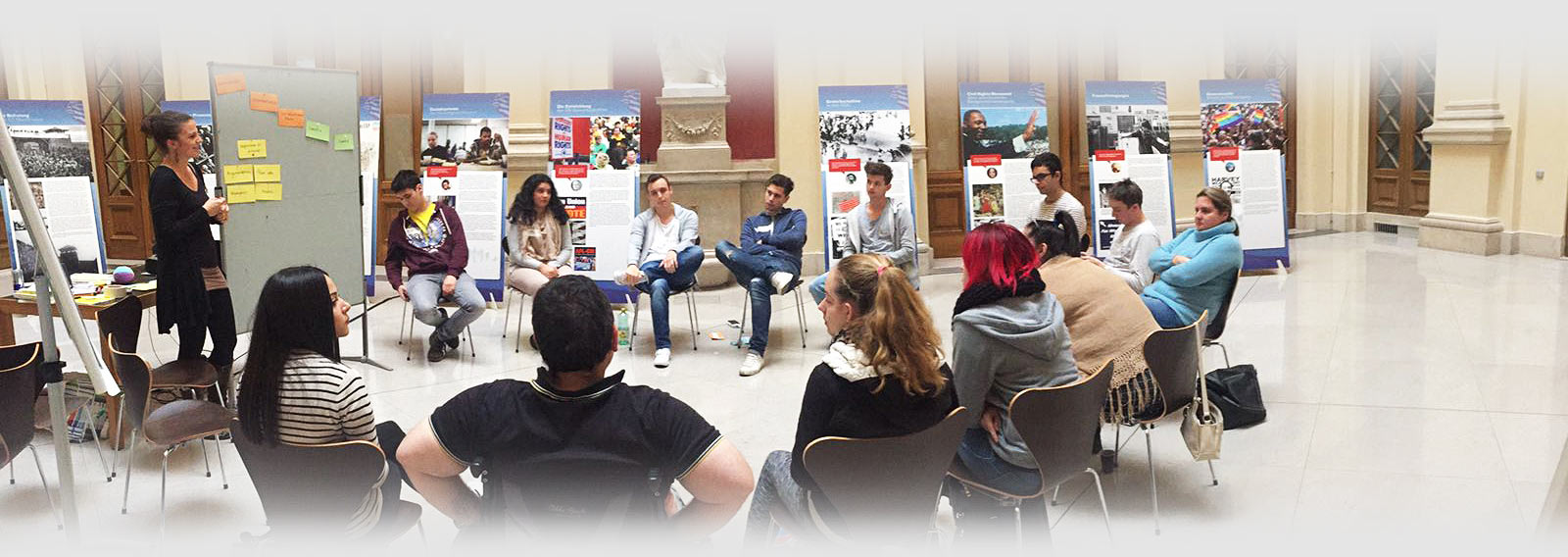Cultural Projects
We attempt to use new approaches to Mauthausen concentration camp and the meaning it holds for Austria's past and present in the form of cultural events.
To offer an idea of the projects and events that we have carried out, we have included a short overview of our activities to date:
Oratorio "... and all the dead died peacefully ..."
Oratorio in five parts for a soloist, choir and orchestra
by Wolfgang R. Kubizek (music) and Vladimir Vertlib (libretto)
The ÖLM and the MKÖ commissioned Wolfgang R. Kubizek to compose a piece of music for the occasion of the 60th anniversary in 2005 of the return of the former concentration camp to the Republic of Austria "with the wish that it becomes a place of memory and memorial for all those who died for a free and democratic Austria" (Hans Maršálek).
As a symbol of the new memorial culture, the Upper Austrian composer Wolfgang R. Kubizek (1959-2008) was commissioned to compose an "Oratorio" that addresses the difficult legacy and inheritance that Mauthausen represents. The libretto was written by the St. Petersburg (then Leningrad) born Vladimir Vertlib, who now lives in Salzburg (The Extraordinary Memory of Rosa Masur, The Last Testament, My First Murderer).
The piece premiered on 5th May 2007 on the roll call area at Mauthausen concentration camp. A further performance took place on the 10th May in the Birago barracks in Melk.
Oratorio: Song of Terezin
The Austrian Mauthausen Committee facilitated a series of performances of this work, beginning that began with its premiere ain Mauthausen concentration camp and ending with a performance on the International Remembrance Day for National Socialism in the State Opera, Prague on 27th January 2004.
When Franz Waxman was commissioned as part of the Cincinnati May Festival in 1963 to compose a piece which was to include a poem about children, his research led him to the poems and pictures done by the Jewish children in the Theresienstadt Ghetto. The composer chose eight poems and used them to create a 50 minute piece for a large, mixed choir, children's choir, soloist and a large orchestra. The Song of Terezín was premiered on 22nd May 1965 with 600 singers, the Cincinnati Symphony Orchestra and the singer Betty Allen. Further performances took place in Europe.
Waxman left Germany in 1934 due to the Nazi terror and became a successful Hollywood film music composer. Nominated for several Oscars and winning two, his son, John Waxman explained that his father was inspired by his work to visit Terezín for himself, despite suffering from advanced cancer. Waxman conducted the first performance of his work himself at a concert during the Los Angeles Music Festival. It was to be his last concert.
Musical Director: Prof. Thomas Kerbl
Arrangement: Mag. Elzbieta Zmuda
Project Organisation and Fundraising: Helmut Edelmayr
Production Coordination: Heidi Ecker
Lighting und Video Technic: Ingo Kelp
Video-Clips: Students from the Art University Linz
Opera: The Emperor of Atlantis or Death Resigns
The premiere of this opera took place at the Mauthausen concentration camp, with further performances at the Ebensee Memorial, Schloss Wildberg and the Odeon Theater in Vienna.
The series of performances was organised by ARGE Atlantis, a cooperation made up of the Wildberg Cultural Organisation, the Austrian Camp Association Mauthausen, Mauthausen Aktiv Austria, the former concentration camp Ebensee, the Jewish Community in Vienna and the Orpheus Trust. The opera was directed by Kurt Ockermüller, with the musical arrangement by Thomas Kerbl.
The opera was written by Peter Kien (libretto) and Viktor Ullmann (score) in the Theresienstadt Ghetto 1943-44. When the SS discovered the impact and meaning of the piece the writers and all those involved were deported to Auschwitz where they were then murdered. Incredibly, the score survived. The first premiere of the opera was in Amsterdam in 1975 and once more introduced the composers to a wider public.
"We listen, we see, we speak"
Memorial event for the occasion of the 60th anniversary of the founding of the Mauthausen concentration camp, held at the onsite quarry "Wienergraben".
Shortly after the so-called "Anschluss" of Austria to Nazi Germany the National Socialists founded the Mauthausen Concentration on 8th August 1938. The granite quarry "Wienergraben" was both a symbol of Nazi barbarity and an instrument of the "annihilation through work" system they operated. The quarry had been the property of the City of Vienna, the SS initially leased the tract of land before eventually acquiring the whole area.
In remembrance of the victims of the Nazi regime, a scenic collage was installed on 8th August 1998 aimed at stimulating discussion about this period. The work was designed to be touching, to show that democracy is not a gift, that freedom and democracy are under constant threat and that we all have a responsibility to defend and strengthen them.
Internationally renowned artists took part, motivated by their own personal conviction:
Music: Joe Zawinul
Literary Texts: Gerhard Roth
Performance: Frank Hoffmann
Artistic Director: Mag. arch. Anton Falkeis

